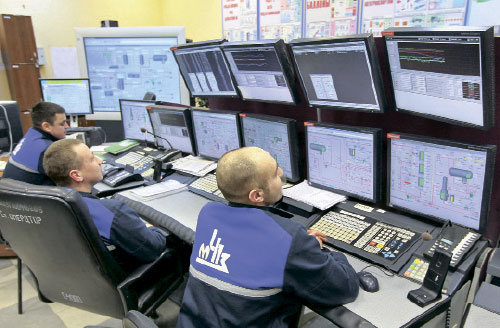
Technological process is under control at Mozyr Oil Refinery. Photo: BelTA
Belneftekhim Chairman, Igor Lyashenko, explains, “Naturally, the cost of a barrel of oil influences our exports’ profitability. Since January 1st, Belarusian refineries have been buying oil from Russia under new conditions of ‘tax manoeuvre’ — a new reality for our country. At present oil prices, our revenue is less than last year: we are losing around $20 per tonne.”
Despite the present situation, Belarusian refineries are in no hurry to ask for Government subsidy, being able to cover their expenses and continue modernisation. Mr. Lyashenko tells us that, when foreign investments are lacking, companies use their own funds, or apply for bank loans to invest in modernisation. Current works should be complete in 2016 and 2017.
 In line with the approved oil balance, in 2015, Belarus is to supply 2.1m tonnes of oil products to the Russian market, while the volume of car fuel supplies will reflect the amount of Russian oil received by Belarus (a projected 23m tonnes). A review takes place every three months and, if Minsk fails to meet its oil supply obligations, Moscow has the right to limit its oil sales to Belarus. However, Russia recently announced that it will not hold us to the agreement, being sympathetic to the situation at Belarusian oil refineries.
In line with the approved oil balance, in 2015, Belarus is to supply 2.1m tonnes of oil products to the Russian market, while the volume of car fuel supplies will reflect the amount of Russian oil received by Belarus (a projected 23m tonnes). A review takes place every three months and, if Minsk fails to meet its oil supply obligations, Moscow has the right to limit its oil sales to Belarus. However, Russia recently announced that it will not hold us to the agreement, being sympathetic to the situation at Belarusian oil refineries.
Naturally, drivers are eager to know the price of fuel at the pump and, to their relief, it appears that prices will fall. By late 2014, AI-92 fuel had been fixed to the Dollar exchange rate to ease calculations; since then, prices have only changed once. Mr. Lyashenko notes, “We are studying prices in neighbouring states, alongside world oil prices, to decide on how to price our fuel. We currently charge less than our neighbours. Fixing prices to the Dollar rate was topical when each oil barrel was valued at $75. Now, retail fuel prices will change drastically. If oil prices fall, fuel costs will be cut.”
Regarding duties, these stand at a modest 25-30 percent. Around 60 percent of the pump price accounts for the cost of oil, with the rest covering salaries for refinery staff, drivers, and those working at refuelling stations, as well as other expenses.
By Alexander Benko











